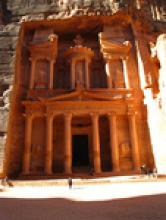The most recent episode of Destination Truth was really one of the best so far. If only because their first destination was Petra, which was recently crowned one of the Seven Wonders of the World, and rightfully so. Petra is incredible, and I hope one day to visit there.
But not after dark!
In one of the tombs, host Josh Gates asks "Is anyone else here?" and a voice clearly and immediately answers "Yes." Frankly, I would have wet my pants. This disembodied voice was preceded by throwing a rock at Gates, and followed by the sounds of scraping and clanging metal, like a sword fight.
All three of these items were reported as being associated with the Djinn, who are said to inhabit Petra. (Who could blame them? Have you seen pictures?)
The only other characteristic behavior which the Destination Truth team didn't see was that the Djinn are said to call your name from the darkness. Creepy, right? I can't help but think of several occasions on "Ghost Hunters" where either Jason or Grant has heard their name being called, either audibly or on EVP.
I am also reminded of the Turkish and Eastern European legend of the Karakoncolos, who wanders about in the dead of winter, calling your name from the darkness. The Karakoncolos also takes a human form, to stand on street corners and ask questions of passers-by. (If you know what's good for you, you'll use the word "black" when you answer his questions.)
Interesting that legends and occurrences from such diverse places could all follow the same general pattern.
When most people think "Djinn" what they actually think is "Genie." Which is to say, a guy (possibly Robin Williams) with curly shoes who lives inside Aladdin's magic lamp. That, or Barbara Eden.
But in the Arabic world, the Djinn are one of God's three sentient creations, along with humans and angels. Djinn are mentioned in the Qur'an as one of the two creations who have free will (along with humans). The Qur'an also says that they are made of "smokeless flame," which describes something that Western ghost hunters might construe as an "orb."
("Djinn" is the collective term. A single entity is called a "jinni.")
Djinn are said to not only form communities just like humans (with "kings, courts of law, weddings, and mourning rituals") but they can also travel instantaneously to any point on the globe, and take the form of any creature. The Djinn can be either friendly and good-natured or evil, and an evil Djinn is very evil indeed. It is treacherous, malicious, and can possess you.
Just as with humans, there are many different kinds of Djinn leading many different lifestyles. One sub-set of Djinn is called the Ifrit. These are Djinn who specialize in inhabiting abandoned buildings (like Petra, or Preston Castle). The Ifrit are notoriously strong and cunning (which didn't help the Ifrit featured in Neil Gaiman's "American Gods," although it did serve the Ifrit in "Graveyard Tales" well).
But not after dark!
In one of the tombs, host Josh Gates asks "Is anyone else here?" and a voice clearly and immediately answers "Yes." Frankly, I would have wet my pants. This disembodied voice was preceded by throwing a rock at Gates, and followed by the sounds of scraping and clanging metal, like a sword fight.
All three of these items were reported as being associated with the Djinn, who are said to inhabit Petra. (Who could blame them? Have you seen pictures?)
The only other characteristic behavior which the Destination Truth team didn't see was that the Djinn are said to call your name from the darkness. Creepy, right? I can't help but think of several occasions on "Ghost Hunters" where either Jason or Grant has heard their name being called, either audibly or on EVP.
I am also reminded of the Turkish and Eastern European legend of the Karakoncolos, who wanders about in the dead of winter, calling your name from the darkness. The Karakoncolos also takes a human form, to stand on street corners and ask questions of passers-by. (If you know what's good for you, you'll use the word "black" when you answer his questions.)
Interesting that legends and occurrences from such diverse places could all follow the same general pattern.
When most people think "Djinn" what they actually think is "Genie." Which is to say, a guy (possibly Robin Williams) with curly shoes who lives inside Aladdin's magic lamp. That, or Barbara Eden.
But in the Arabic world, the Djinn are one of God's three sentient creations, along with humans and angels. Djinn are mentioned in the Qur'an as one of the two creations who have free will (along with humans). The Qur'an also says that they are made of "smokeless flame," which describes something that Western ghost hunters might construe as an "orb."
("Djinn" is the collective term. A single entity is called a "jinni.")
Djinn are said to not only form communities just like humans (with "kings, courts of law, weddings, and mourning rituals") but they can also travel instantaneously to any point on the globe, and take the form of any creature. The Djinn can be either friendly and good-natured or evil, and an evil Djinn is very evil indeed. It is treacherous, malicious, and can possess you.
Just as with humans, there are many different kinds of Djinn leading many different lifestyles. One sub-set of Djinn is called the Ifrit. These are Djinn who specialize in inhabiting abandoned buildings (like Petra, or Preston Castle). The Ifrit are notoriously strong and cunning (which didn't help the Ifrit featured in Neil Gaiman's "American Gods," although it did serve the Ifrit in "Graveyard Tales" well).
Creative Commons-licensed image courtesy of Flickr user betta design
